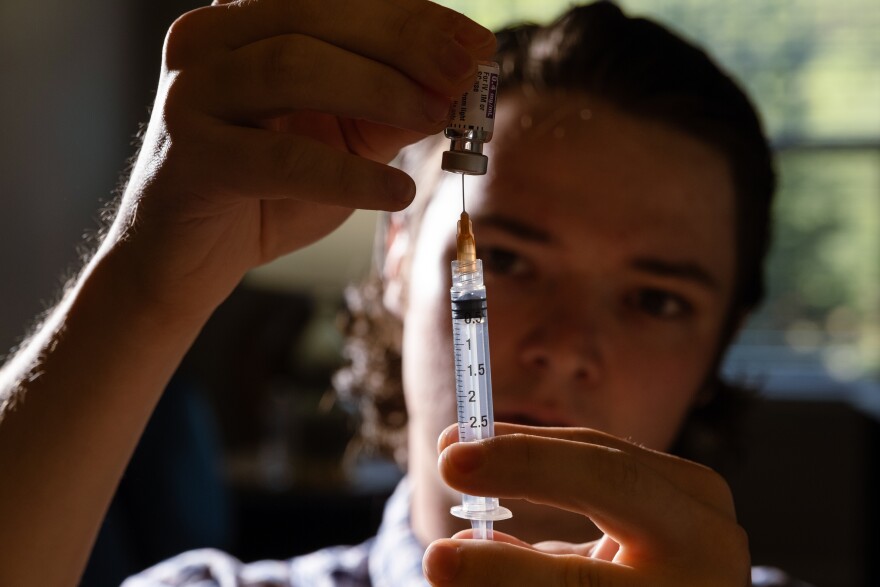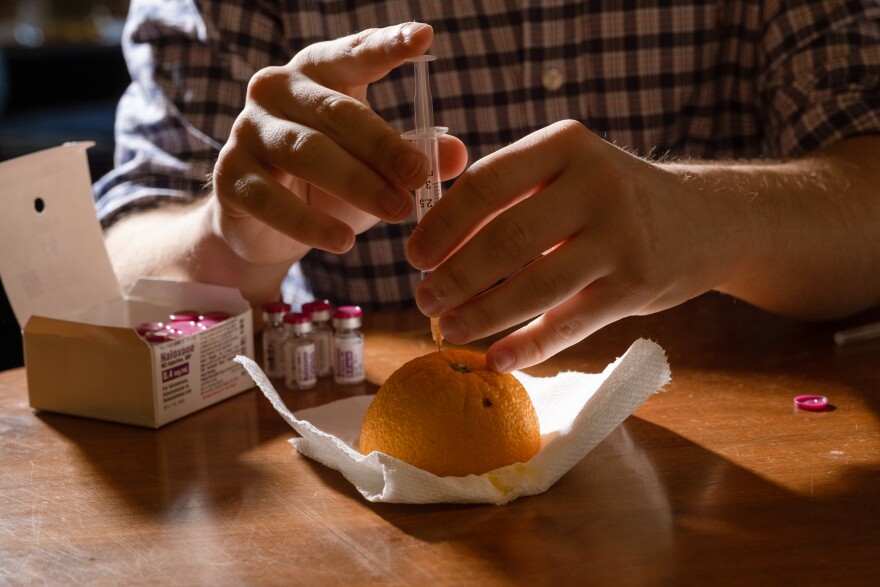College senior Riley Sullivan often carries a vial of the drug naloxone in his backpack, in a pocket next to his pens and pencils.
He has done this for years, long before he was a student at UNC-Chapel Hill. Once, while volunteering at a homeless encampment in his home state of Michigan, he used it to save a man’s life.
“He was using drugs with somebody else, and they did not have naloxone,” Sullivan says. “This guy came out screaming, asking if anyone had some. And I did.”
Naloxone is the antidote to an opioid overdose. Sullivan took a syringe of injectable naloxone from the backpack he was carrying, walked into the tent and loaded it with a vial of medicine.
“I injected it through his pants, into the front of his thigh,” Sullivan recalled. Then he performed rescue breathing on the man. “And luckily he made it.”
Today, Sullivan has a $15,000 supply of injectable naloxone in his closet at his off-campus apartment in Chapel Hill. He and two of his classmates have become unexpected distributors of the drug in this college town where several students have recently died from opioids.
The deaths are largely unknown to the campus community, but they were discussed at a recent public meeting of the UNC-Chapel Hill Board of Trustees. The university's director of student wellness Dean Blackburn led the presentation.
“I want to share a shocking statistic with you, that I hope you find shocking. It is for me. In the last 20 months, we have lost three active students and one young alum to fentanyl poisoning," Blackburn said. "And I use that term specifically; not ‘overdose’ because our students and alum were not using fentanyl."
“They were using other substances that were laced with fentanyl, and they did not know that. And the result of that poisoning was their death and our loss,” he added.
Blackburn shared these details with the board after hearing it personally from the students’ families. He later told WUNC the university has not released this information broadly and would not typically for any kind of student death, out of respect for their families’ privacy.

“I want to share a shocking statistic with you, that I hope you find shocking. It is for me. In the last 20 months, we have lost three active students and one young alum to fentanyl poisoning,"Dean Blackburn, UNC-Chapel Hill director of student wellness
As a policy, the university does not send out campus-wide emails about student deaths because they could be “triggering for members of our community and are often more harmful than helpful,” according to UNC Media Relations. The university police send out text message alerts only when they determine there is an ongoing threat to the campus community.
It's unknown whether that number of opioid related deaths at a college is unusual. These statistics are not systematically tracked at UNC-Chapel Hill or nationwide. The university only tracks data about deaths if they are reported in annual campus crime statistics, as required under The Clery Act. Federal reporting guidelines do not require tracking of drug overdoses.
The most relevant data available from the Centers for Disease Control and Prevention is the number of 15 to 24-year-olds who die of fentanyl poisoning in the United States annually — about 17 deaths per 100,000 young people in 2021.
Students motivated by concern for their loved ones

Given what they describe as a quiet response from the university regarding the recent deaths, Sullivan and his friends Callan Baruch and Caroline Clodfelter are taking it upon themselves to educate their classmates about how to prevent deaths by fentanyl. They formed the Carolina Harm Reduction Union.
They’re motivated by experiences they had before ever setting foot on campus. They each have family and friends whose substance use ranges from full-on addiction to occasional use at parties.
“And I want to keep them safe,” Sullivan said.
“Addiction is an illness, and it affects everybody,” Baruch added.
“I didn't approach my friends who were struggling in the right way,” Clodfelter said.
Clodfelter didn't feel like she was truly helping friends who already used drugs. Now, she believes in harm reduction. This approach accepts that some people do use drugs and focuses on how to keep them safe.
“Harm reduction to me is also more than just naloxone," Clodfelter said. "It's the support and the acceptance that comes with it."
It’s frustrating that the life-saving drug is often not around when someone needs it, Clodfelter added.
The three students envision a future where every college student knows how to use naloxone and carries it on them. On their campus, they want to put naloxone in vending machines, hand it out at regularly scheduled tabling events and allow students to message Carolina Harm Reduction Union on Instagram to request a kit.
Since 2016, the UNC-Chapel Hill student pharmacy has carried naloxone nasal spray that students can get for free at its two locations. Last school year, the pharmacy gave out about 150 kits of the nasal spray, also known by the brand name Narcan. But the students said that sometimes, when they try to request a kit, the pharmacy ran out of supply.
So, Sullivan wanted to get his own, much larger supply. He searched Google for someone who might know how. He found Nabarun Dasgupta.
The 'anti-funeral drug'

Dasgupta, a research scientist at UNC Gillings School of Global Public Health, has been studying opioid overdose prevention and epidemiology for the last 20 years.
When he started his PhD at UNC-Chapel Hill in 2005, Dasgupta told his professors he wanted to hand out naloxone to students.
“They told me point blank that if I did that, I'd get kicked out of school. I did it anyways, and I survived,” Dasgupta said. “I know we helped prevent overdose deaths that the university never heard of.”
In 2022, Dasgupta co-founded Remedy Alliance for the People, a nonprofit that supplies naloxone to grassroots groups. They negotiate contracts with the large pharmaceutical companies to acquire very low-cost and free naloxone for distribution.
He's also well aware of the recent student deaths and the need for naloxone on campus.
“As a parent myself, it is something that feels alarming,” Dasgupta said. “We tend to lump addiction and overdose together as all part of the same, but it's really not. There's also a lot of folks who are going to be using occasionally, one-off at parties, something that someone gave them kind of thing.”
This is the demographic he and the students are most worried about: students who are unaware what substance they’re using or what their tolerance level is.
Fentanyl is a powerful synthetic opioid that can be laced in anything from cocaine to counterfeit prescription meds sold online as Xanax or Ritalin. Just a pinch of fentanyl, about the size of 10 to 15 grains of table salt, can be lethal.
But naloxone can reverse a fentanyl overdose almost immediately.
“Naloxone is what I call an anti-funeral drug,” Dasgupta said. “It's this perfect antidote that really saves people's lives.”
When Sullivan first emailed him, Dasgupta recalled being intrigued but not surprised that the student reached out.
“The students who are entering college right now have been alive for the entire duration of what we think of as the opioid crisis,” Dasgupta explained. “So, it is not surprising that a lot of undergraduates will have had personal and family experiences related to opioids and drug use.”
He helped Sullivan and his friends get exactly what they needed: hundreds of vials of naloxone. It arrived with no charge and no prescription needed. Today, all of it is stored in Sullivan’s closet.
The largest inventory of naloxone in Orange County is likely in a 21-year-old’s closet

Sullivan recently moved into a new apartment, a sparse bachelor pad. The sound echoed off of bare walls as his pantry door squeaked open. He gestured at cardboard boxes filled with more than 500 vials of naloxone.
“To put this in perspective, this would cost us about $15,000,” Sullivan says. “I'm a 21-year-old college student and we pretty much have, at least to our knowledge, the largest inventory of naloxone in Orange County.”
His closet contains more naloxone than UNC Hospitals or the UNC-Chapel Hill student pharmacy. The U.S. Food and Drug Administration recently approved naloxone nasal spray for over-the-counter sales in March, so supplies at local pharmacies could ramp up. But for now, Sullivan’s claim is likely true.
Using an orange he pulled from the refrigerator, he demonstrated how to administer naloxone.
“You first pop the cap off of your vial, and that is breaking the sterile seal,” Sullivan said. “You then pull out your syringe. It's kind of like opening string cheese almost.”
He loaded up the medicine and tapped the bubbles out of the syringe, then injected it into the orange peel. The best thing to do is be gentle with the person, he said.

“If you are in the position where you have had to give someone naloxone, they've almost died. They've gone through a lot in the span of a couple of minutes,” Sullivan said.
Then, he filled a backpack with supplies and headed to campus. The three students began giving it out to students before classes even began at FallFest. It's a UNC-Chapel Hill tradition, where new students pack into the center of campus to browse the booths of student groups they can join.
“Anyone interested in learning about harm reduction techniques on UNC’s campus?” Baruch called out to a crowd of students. “We’re giving out naloxone and fentanyl testing strips if any of y'all would want one.”
Several students walk up.
“Wait, what are these?” one student asked.
“It can fully reverse an opioid overdose,” Clodfelter chimes in.
“So, if you see somebody, if you’re at a party, if you're a frat... are you guys freshmen or sophomores?” Clodfelter asked. “Freshmen. All right, so let's say you're going out to a frat. Stick it in your pocket. It's easy to just have one on you. Also, fentanyl testing strips are good too.”
In what feels like no time, Sullivan's backpack has been emptied.
“We’re already out, and it’s been, what? Like 30-ish minutes,” Sullivan said, incredulously.
They plan to distribute naloxone many more times this year, hoping to hand out the drug in frat houses, dorm rooms and directly in the hands of students.











